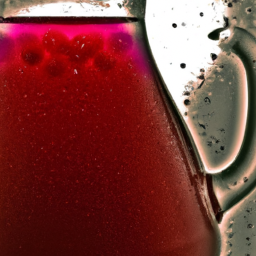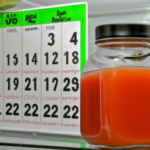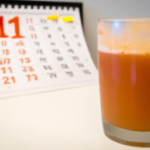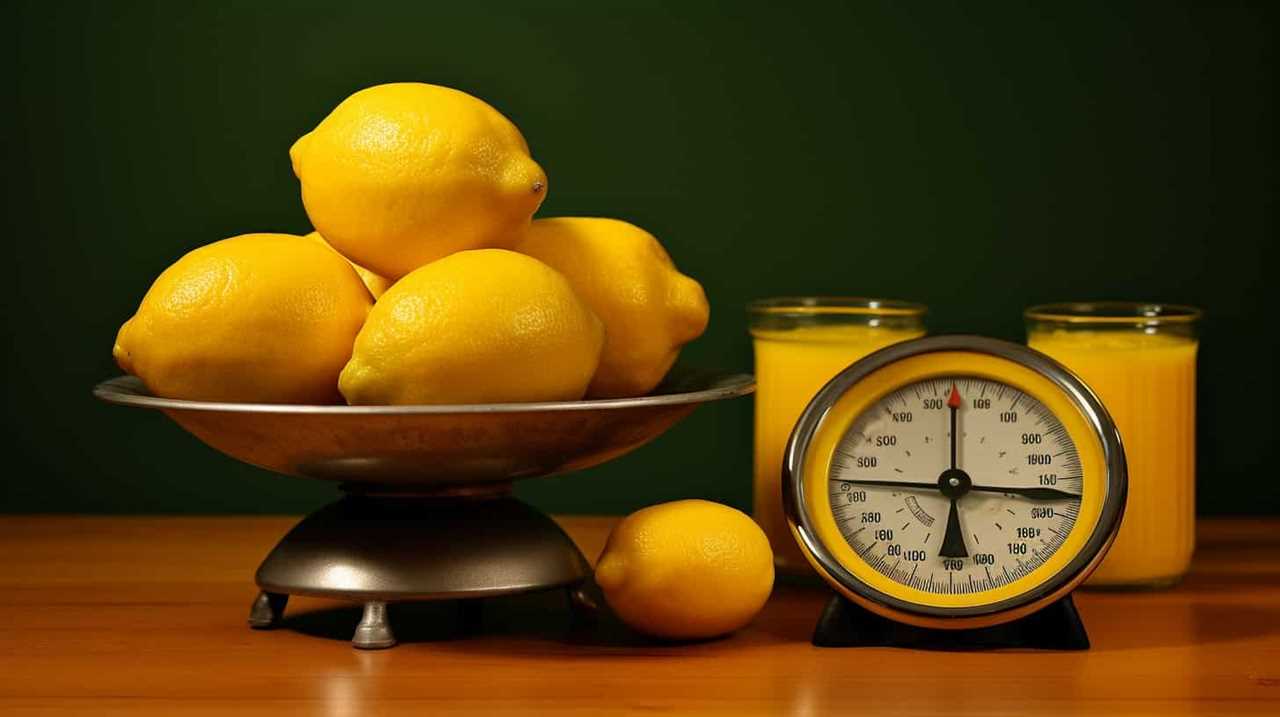As a lover of fresh juice, I frequently ponder how long my juice will remain fresh in the refrigerator. Properly storing fresh juice is essential for maximizing its shelf life and preventing it from spoiling. The duration for which fresh juice stays fresh can vary depending on factors like the types of fruits and vegetables used, the juicing method, and the storage environment.
In this article, I will be discussing how long fresh juice can last in the fridge, as well as the signs that indicate when your juice has gone bad. I will also be sharing tips for properly storing fresh juice to make it last longer, and creative ways to use up expired juice. Additionally, I will highlight the benefits of drinking fresh juice and why it’s important to make the most out of your juice by storing it properly.
So, if you’re someone who loves fresh juice and wants to learn more about how to store it, keep reading!
Key Takeaways
- Factors affecting shelf life of fresh juice include type of fruit/vegetable, juicing method, and storage conditions.
- To maximize shelf life, fresh juice should be stored in an airtight container in the coldest part of the fridge, and consumed within 24 hours to prevent nutrient loss.
- Glass containers with airtight lids are the best option for storing fresh juice, and freezing in small batches can preserve flavor and nutrients for longer periods of time.
- Signs of spoilage include a cloudy appearance, sour smell, and bitter taste, and expired juice can be repurposed for compost, cocktails, or cooking.
The Importance of Properly Storing Fresh Juice
You don’t want to ruin all that deliciousness by leaving your fresh juice in the fridge with the lid half off and the pulp separating into a gross layer at the top. Proper storage is essential to maximize the benefits of fresh juice, and there are best practices to follow to ensure the nutrient retention of your drink.
One of the most common mistakes people make is leaving their fresh juice in the fridge for too long. The longer you leave it, the more nutrients it loses. To retain the maximum amount of nutrients, store your fresh juice in an airtight container and consume it within 24 hours.
Additionally, keep your juice in the coldest part of the fridge to prevent bacterial growth and oxidation. Remember, proper storage is key to enjoying the full benefits of fresh juice.
As important as proper storage is, there are other factors that affect the shelf life of fresh juice.
Factors That Affect the Shelf Life of Fresh Juice
When storing your homemade blend, factors like temperature, acidity, and the presence of preservatives can greatly impact how long it remains drinkable. One of the most important juice preservation techniques is to store it in the fridge at a temperature of 40°F or below. This slows down the growth of bacteria and helps keep the juice fresh for longer.
Acidity also plays a role in juice preservation. Fruits with high acidity, like lemons and oranges, tend to last longer than those with low acidity, like bananas and melons. Additionally, the impact of preservatives on fresh juice shouldn’t be overlooked. Some preservatives, like citric acid and ascorbic acid, can help extend the shelf life of fresh juice. However, other preservatives, like sulfites, may cause adverse reactions in some people.
With these factors in mind, it’s important to consider how long fresh juice can last in the fridge.
When it comes to how long fresh juice can last in the fridge, the answer depends on various factors. Stay tuned to learn more about these factors and how to properly store your fresh juice to keep it drinkable for as long as possible.
How Long Can Fresh Juice Last in the Fridge?
After a few days in the fridge, homemade juice can start to lose its vibrant flavor and become as dull as a cloudy day. However, with proper juice storage tips, you can maximize the freshness of your juice and extend its shelf life.
The best way to store fresh juice is to keep it in an airtight container in the fridge. Glass containers are best, as they won’t leach any harmful chemicals into the juice. Plastic containers, on the other hand, can react with the juice and cause it to spoil faster.
It’s also important to keep your juice away from light and heat, as these factors can degrade the quality of the juice. If you want to store your juice for longer than a few days, consider freezing it in small batches. This will help preserve the flavor and nutrients of the juice for several weeks.
By following these simple juice storage tips, you can enjoy fresh, delicious juice for longer periods of time.
As your juice starts to age, it may develop a cloudy appearance, a sour smell, or a bitter taste. These are all signs that your fresh juice has gone bad and should be discarded.
In the next section, we’ll discuss these signs in more detail and provide tips for avoiding spoilage.
Signs That Your Fresh Juice Has Gone Bad
As time passes, your once vibrant and refreshing juice may develop a cloudy appearance, sour smell, or bitter taste, indicating that it has gone bad. This occurs due to the growth of bacteria in the juice, which can cause food poisoning.
To prevent spoilage, it’s crucial to store your juice properly and consume it within the recommended time frame. One of the common mistakes in storing juice is leaving it at room temperature for an extended period. This allows bacteria to grow rapidly, causing the juice to spoil quickly.
Another mistake is not refrigerating the juice after opening it. Even if the juice is still fresh, it can quickly deteriorate if not stored at the right temperature. To prevent spoilage, store your juice in an airtight container in the refrigerator and consume it within three to five days.
By following these simple tips, you can ensure that your fresh juice stays fresh and delicious for longer. Be sure to store your juice in an airtight container in the refrigerator to preserve its nutrients and natural flavors. Adding a squeeze of lemon or lime can also help slow down the oxidation process, which will make fresh juice last longer. Additionally, try to consume the juice within 48 to 72 hours for optimal taste and health benefits.
Tips for Properly Storing Fresh Juice
Properly storing your juice is like putting on sunscreen before heading to the beach – it may take a little extra effort, but it’ll protect you from harmful consequences in the long run.
When it comes to storing fresh juice, it’s important to use the right juice storage containers. Glass containers with airtight lids are the best option since they don’t react with the juice and don’t allow air to seep in. This helps to prolong the shelf life of the juice.
In addition to using the right containers, there are also best juicing practices that can help extend the life of your juice. For example, it’s important to juice fruits and vegetables as soon as possible after purchase and to avoid over-juicing, which can cause oxidation and spoilage.
Once the juice is made, store it in the fridge immediately and consume within 24-48 hours for best results.
Following these tips for proper juice storage will help ensure that your fresh juice remains at its best quality for as long as possible.
Now that you know how to properly store your juice, let’s move on to the next step: how to tell if your fresh juice is still good.
How to Tell If Your Fresh Juice Is Still Good
Don’t let your taste buds suffer – check the quality of your juice by giving it a whiff and a sip. While fresh juice can be a healthy and delicious addition to your diet, it’s important to know when it’s time to toss it out. Shelf stability and microbial growth are two factors that can affect the freshness and safety of your juice.
To determine if your fresh juice is still good, use the table below as a guide. It provides a general timeframe for how long specific types of juice can last in the fridge, as well as signs of spoilage to watch out for. Keep in mind that these are just estimates, and the actual shelf life of your juice may vary depending on factors such as the quality of the ingredients, how it was stored, and the temperature of your fridge. If your juice smells or tastes off, or if you see any mold or discoloration, it’s best to err on the side of caution and throw it out.
| Type of Juice | Shelf Life in Fridge | Signs of Spoilage |
|---|---|---|
| Citrus | 2-3 days | Sour smell, cloudy appearance |
| Apple | 3-5 days | Tangy smell, fermentation |
| Green | 3-5 days | Bitter taste, separation |
| Beet | 3-5 days | Earthy smell, slimy texture |
| Carrot | 5-7 days | Off flavor, discoloration |
If you find yourself with expired juice, don’t fret. There are plenty of creative ways to use it up, such as adding it to smoothies or using it as a marinade for meats. Let’s explore some of these options in the next section.
Creative Ways to Use Up Expired Juice
Looking for ways to use up that expired juice? You’ll be happy to know that over 50% of Americans throw away perfectly good food, including juice, due to expiration dates. But before you toss that juice in the trash, consider these creative ways to use it up.
First, you can use expired juice for compost. Simply pour the juice into your compost bin or pile, and let it add some nutrients to your soil.
Alternatively, you can use expired juice for cocktails. While it may not be suitable for drinking on its own, mixing it with other ingredients can create a tasty and unique cocktail.
Using expired juice for cooking is a bit more complicated. While some experts say it’s safe to use in cooking, others caution against it. It’s important to consider the type of juice and how long it has been expired before using it in a recipe. Ultimately, it’s up to your own discretion whether or not to use expired juice in cooking.
Now that you know some creative ways to use up expired juice, let’s talk about how to make your fresh juice last longer.
How to Make Your Fresh Juice Last Longer
Want your morning juice to stay delicious for days? Try these easy tips to make it stay fresh and flavorful.
-
Store it in an airtight container: Oxygen is the enemy of fresh juice. To prevent it from oxidizing and spoiling, store it in an airtight container. I like to use glass jars with tight-fitting lids. They’re easy to clean and keep the juice fresh for up to 72 hours. Plastic containers are also an option, but make sure they’re BPA-free and food-grade.
-
Refrigerate it immediately: As soon as you finish juicing, transfer the juice to the fridge. The cold temperature slows down the spoilage process and keeps the nutrients intact. Don’t leave it at room temperature for too long, or you risk bacterial growth and fermentation. Ideally, you should drink the juice within 24-48 hours to get the most out of it.
-
Add lemon or lime juice: Citrus fruits are natural preservatives that can extend the shelf life of fresh juice. They contain citric acid and ascorbic acid, which inhibit the growth of bacteria and mold. Plus, they add a zesty flavor and a boost of vitamin C. Squeeze some lemon or lime juice into your juice before storing it in the fridge. You can also add a slice of lemon or lime to the container for extra freshness.
By following these ways to preserve juice, you can enjoy your homemade juice for longer and reap the benefits of juicing at home.
Now, let’s move on to the next section and talk about the benefits of drinking fresh juice.
Benefits of Drinking Fresh Juice
Drinking fresh juice not only provides a burst of flavor but also delivers a plethora of health benefits that can improve your overall well-being.
One of the most popular trends in juicing is the juice cleanse, which involves drinking only fresh juices for a certain period of time to detoxify the body and improve digestion.
The vitamins and minerals in fresh juice can also boost your immune system and energy levels, making it a great addition to your daily routine.
In addition to juice cleanses, juicing recipes can be customized to meet your specific health needs.
For example, adding ginger to your juice can help with inflammation, while kale and spinach can provide an abundance of antioxidants.
By incorporating fresh juice into your diet, you can receive a wide range of nutrients that may be lacking in your regular meals.
So next time you have the opportunity to enjoy a glass of fresh juice, remember that it’s not only delicious but also packed with beneficial vitamins and minerals.
Frequently Asked Questions
Can I freeze fresh juice to make it last longer?
Yes, freezing fresh juice can extend its shelf life. However, it’s important to use freezer-safe containers and leave some room for expansion. Thaw in the fridge and consume within 24 hours.
Is it safe to drink fresh juice past its expiration date?
Drinking fresh juice past its expiration date can pose potential health risks due to the growth of harmful bacteria. It is important to adhere to the recommended shelf life and discard any expired juice to avoid illness.
How often should I clean my juicer to prevent bacteria growth?
I clean my juicer after every use to prevent bacteria growth. Using natural cleaning products ensures the benefits of a chemical-free juicing experience. It’s important to use a food grade cleaner for juicer maintenance.
Can I mix different types of fresh juice together to create a new flavor?
Yes, I often mix different types of fresh juice together to create a new flavor. It’s a fun way to experiment with taste and get creative with my juicing. Mixing juices can provide a unique flavor profile that’s both delicious and nutritious.
Is it necessary to refrigerate fresh juice immediately after juicing or can I leave it out for a little while?
As soon as I finish juicing, I refrigerate my fresh juice to preserve its nutrients and prevent bacterial growth. Proper storing techniques greatly affect the shelf life expectancy of fresh juice, so it’s best to err on the side of caution.
Conclusion
In conclusion, the shelf life of fresh juice depends on several factors such as the type of juice, storage conditions, and presence of preservatives. However, regardless of these factors, fresh juice can last for up to 72 hours when stored in the fridge. It is important to note that different types of juices may have varying shelf lives; for instance, celery juice storage time might be a bit shorter due to its fast degradation of nutrients and taste. To maximize freshness, always store juice in airtight containers to limit exposure to air and prevent oxidation. For the best quality and nutrient retention, consuming your juice within the recommended time frame is ideal.
It’s important to consume fresh juice before it goes bad to avoid the risk of food poisoning. As I pour myself a glass of freshly squeezed orange juice, I’m reminded of the importance of proper storage to ensure the juice remains fresh and safe to consume.
Just like how we need to take care of ourselves to stay healthy, we also need to take care of our fresh juice to reap its benefits. So, let’s appreciate the gift of fresh juice and make sure to store it properly to enjoy its refreshing taste and health benefits.
Cindy thoroughly researches juicing trends, techniques, and recipes to provide readers with practical advice and inspiration. Her writing style is accessible, engaging, and designed to make complex concepts easy to understand. Cindy’s dedication to promoting the advantages of juicing shines through her work, empowering readers to make positive changes in their lives through the simple act of juicing.

















